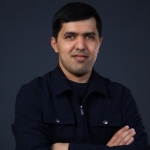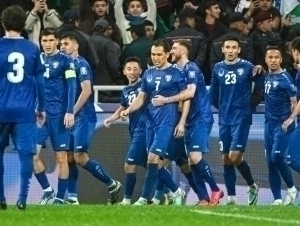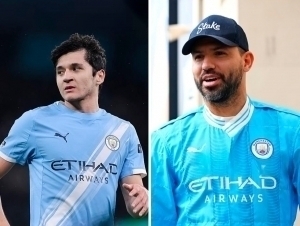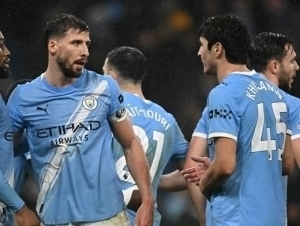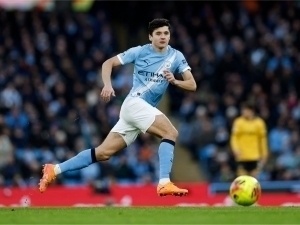From national team star to social media target: The Khusanov case
Sport
−
28 March 2025 38804 14 minutes
Before we begin, here's a quick disclaimer: The protagonist of today’s discussion frequently deletes his videos from social media, so don’t expect to find additional posts in this video.
Why is a concert stage positioned a meter above the audience? Why is an octagon enclosed by a fence? Why is entry onto a football pitch restricted to players and referees? The distance between performers—whether in sports or the arts—and their audience exists for a reason. It ensures that fans remain spectators rather than participants, respecting both the performers’ space and their boundaries.
Globally, and particularly in football, strict protocols, contracts, and security teams safeguard players. Their personal space, mental and physical well-being, and safety are all carefully managed. In elite clubs like Manchester City, Real Madrid, or Barcelona, fans do not get unrestricted access to players. Yet, in Uzbekistan, the situation is entirely different.
In Uzbek sports—especially football—the enforcement of international regulations regarding player protection has long been neglected. Here, every fan seems to think they have a personal connection with the players. They can interact with them freely, use them for promotions, track their movements, and invite them to events as casually as one might invite a Santa Claus impersonator to a party. This lack of boundaries is glaringly evident in the case of Abdukodir Khusanov, Uzbekistan’s national team player and Manchester City footballer.
In Uzbekistan, certain privileged fans manage to share hotels, flights, and even bus rides with players. Exploiting their access, they produce social media content featuring these athletes—often with hidden advertising. Players are placed in uncomfortable situations where refusing is not an option.
Nowhere else in the world do we see such blatant marketing tactics—fans turning footballers into unpaid brand ambassadors. In Uzbekistan, individuals use their access to players during international matches to promote products, distributing chocolates in hotel rooms and integrating hidden advertisements into social media content. In other countries, such actions would be met with hefty fines from football organizations. But here, it is tolerated.
Much has been said about Abdukodir Khusanov, particularly following his disappointing performance against Iran. No one expected a Manchester City player to be the weakest link in the Uzbek national team during such an important match. Some argue that Khusanov’s lapses in concentration directly contributed to goals conceded by Uzbekistan.
There are theories that players returning from foreign clubs approach international matches cautiously, prioritizing their club careers and financial contracts over national duty. However, Khusanov is at a stage where he must prove himself in every match, regardless of location. His performance should reflect his full potential—provided he is in the right physical and mental state.
Following the Iran match, many fans and experts questioned why a Manchester City player made so many errors and why he seemed so off his game.
The problem? Overexposure. When a player receives excessive attention, is constantly surrounded by people, appears in numerous videos, and is exploited for content creation, it inevitably takes a toll on his focus.
Upon arriving in Tashkent for a brief period during the World Cup qualifiers, Khusanov seemed preoccupied with everything except football. For example, despite being in Tashkent, he skipped the pre-match training session against Kyrgyzstan on March 17, choosing instead to attend a personal family event.
Khusanov was seen at a tailor’s shop, at Navruz celebrations, in wedding videos, at a barbershop, and in multiple bloggers’ posts. Meeting him by chance, taking photos with him, and using him for advertising have become so common that his presence now holds more commercial than sporting value.
But why has Khusanov been placed in such a vulnerable position? If the Uzbekistan Football Association (UFA) cannot prevent unauthorized individuals from entering the team’s hotel and interfering with players’ privacy, then how can we expect national team members to focus entirely on their performance?
If a self-proclaimed "fan" can meet Khusanov at the airport, travel with him by car and bus, create social media content with him, and use his image for advertising without repercussions, it’s no surprise that his game suffers. Even footballers far more experienced than Khusanov would struggle under such conditions.
According to reports, Abdukodir Khusanov's father, Hikmat Khoshimov, personally requested that his son be met at the airport. This was confirmed by Hikmat Khoshimov himself in a statement to QALAMPIR.UZ. The individual in question, Fozilov, allegedly paid contacts to facilitate Khusanov’s transfer from the public arrivals hall to the VIP section and arranged a private car to take him home.
Isn’t this an embarrassment for FIFA? How can a national team player arriving from Manchester to compete in World Cup qualifiers be handed over to a regular fan instead of being received by official representatives? What exactly is Fozilov’s role in Uzbek football?
FIFA has established clear regulations concerning national team players’ activities during training camps and official matches. These rules dictate where players can be, whom they can meet, and what external influences they are exposed to. Players are expected to remain under the supervision of the national team’s management in designated locations—hotels, training grounds, and stadiums. Restrictions on personal visits during training camps are put in place to maintain focus and discipline.
The UFA, however, failed to enforce these rules. It allowed a so-called fan—a blogger with no official connection to football—to greet Khusanov at the airport, enter the team’s hotel, and create content using the players. Worse still, UFA officials, including Ravshan Irmatov, seemingly turned a blind eye to the situation.
As a result, Khusanov was treated as a marketing tool rather than a professional athlete. His image was used for advertisements, from hair salons to luxury watches. Some businesses even gifted him products—gasoline, PlayStations, and accessories—just to feature him in their content. His father and brother were also included in these promotional efforts, further blurring the lines between his personal life and his football career.
This raises an important question: does a player like Khusanov, earning a professional salary, really need free services or gifts? If he were to officially endorse a product, his fee would be significantly higher than the value of a $1,000 watch. Those exploiting his name and image for commercial gain may not even realize that their actions potentially violate international privacy laws.
Ultimately, everyone involved was looking out for their interests—except for Khusanov. Even those closest to him failed to protect his image. At just 21, he comes across as a polite and well-mannered young man who struggles to refuse people. This makes him an easy target for those seeking to benefit from his fame.
National team players, Olympians, and other athletes have surrounded him, leveraging his name to boost their reputations. He has been placed in situations where he cannot say no, making him vulnerable to those who exploit his generosity.
To better understand the extent of this issue, QALAMPIR.UZ’s regular partner, Samvel Karlenovich, highlighted how bloggers’ interference negatively impacts players. Specifically, he examined the link between Khusanov’s social activities in the week leading up to the Iran match and his unexpected drop in performance.
Social media that tires a football player
Life without breaks
Smith & Green (2019): According to researchers, if football players devote a lot of time to social activities, this significantly reduces their ability to recover, sleep, and heal. This increases the risk of injury and physical decline.
March 17 – Khusanov in Tashkent:
- Khusanov’s welcome and surrounded by bloggers
- Mercedes-Benz G-Class key and “case” gift from blogger Abdurakhmon Fozilov
- A private “Marry me” ceremony – a romantic pre-wedding event
Impact: This load took away not only time but also the opportunity to recover. Khusanov was unable to join the national team’s first day of training.
Mental fatigue and decreased attention span
Weinberg & Gould (2019): Regular social activity, especially maintaining a “fake face” – that is, being constantly open and polite to please everyone – is very tiring for the brain. This reduces decision-making ability and leads to a lack of mental rest.
March 18:
- Questions were asked at the national team meeting that are not typical of sports journalism.
- Criticism and discussions have increased on the networks.
- Don't forget Abdurakhmon Fozilov's role on Instagram: he invited Khusanov for personal PR content and used him for selfies, videos, and "content". This imposed a constant "no" routine on the brain.
Effects: Mental fatigue, emotional exhaustion, and decreased attention. Every decision on the field is directly related to brain activity.
Sleep disturbance
Kristiansen & Roberts (2010): events, bright environments, and stress disrupt the production of the sleep hormone (melatonin). This directly affects muscle recovery, the immune system, and overall sports performance.
March 20 - Game against Kyrgyzstan:
- He played very well, but he stayed too long in the post-match photo shoot, interviews, and communication with fans.
March 21 – Nowruz celebration:
- 90 minutes of football, after little sleep, was involved in a public event in the morning in the “Yangi Uzbekistan” park.
Impact: Lack of sleep and impaired muscle recovery do not allow the athlete to regain strength for the next day.
Ineffectiveness in the game
Johansson & Andersson (2020): A decrease in the effectiveness of players with high social activity on the field has been observed. The player spends more energy on appearance and communication with fans than on physical preparation. This results in slower decision-making, mistakes, and lack of strength.
March 22:
Refused to sign the “Real Madrid” jersey. This caused discussion on social networks - pressure on him increased.
March 25 – Match against Iran:
Lowest rating in the team - a result of fatigue.
Impact: Psychological fatigue, overload, and lack of sleep all negatively affected his performance.
What to do?
The time and protection of the football player must be respected. Organizers, bloggers, and fans should not be able to approach him at any time.
The UFA should regulate PR activities. The personal life of the football player, training, and social events should not clash with each other.
An image maker or media manager is needed. Stars like Khusanov should be protected. Every PR post can affect the results of the sport.
It is a big mistake to treat a football player as a "PR victim". The events of a week with Abdukhodir Khusanov have shown what negative consequences can be behind every small piece of content. Scientific studies indicate that excessive social loads hinder an athlete from achieving results on the field.
Balance is the only guarantee of success.
QALAMPIR.UZ was interested in the expert's opinion on the situation with the UFA and Abdukodir Khusanov and the fact that bloggers are too close to football players and create unnecessary psychological stress on them.
Sanat Sharipov:
“If we talk about the tasks of the UFA, of course, their task is to ensure the safety of the players. However, the UFA does not have professionals. Otherwise, they would not allow such things. Because they have become Instagram stars. This is something they like. If there were leaders of the organization who respected themselves, they would not let fans and acquaintances even come close to the pitch. These bloggers even travel on the same bus, plane, or hotel with the national team. There is a perception in the Uzbeks that players are either afraid or ashamed to say, “Brother, leave us alone.” You will not find fans of any other national team so close to the players. Babayan also paid close attention to these things. He also did not allow external factors to interfere with the national team.”
Well-known commentator Khairulla Khamidov, in his commentary of the match, pointed out that Abdukodir Khusanov's mistakes, who was not playing well during the match, should be mentioned as little as possible, that the player was not able to play effectively, and that, of course, the external influence was significant.
"Abdukodir Khusanov's 'adventures' in Tashkent have certainly affected his game. Many people are saying this, and I don't want to direct this to just one person. I was happy to hear one thing yesterday. I think the right conclusions were drawn. A guest should have been invited to the Zo'r TV channel before the game. They offered various options for the guest. Finally, Muhammadali Urinbaev came and commented on the game with Hasan Turdaliev in the first half. Before Muhammadali, many people were invited. Among the invitations was one for Khusanov's father, Hikmat Khoshimov. According to the channel's officials, Hikmat aka did not agree and stopped giving interviews. I was happy. First of all, this father made the right conclusion. Because it happened, events happened. Maybe he thought that other things would happen. He made the right conclusion because the incident with Khusanov's car when he arrived in Tashkent had a negative effect," says Khamidov.
Abdukodir Khusanov is currently in the spotlight of various vloggers and bloggers, if necessary his brother. If they can't eat together in the teahouse, then he is very close. Various content is being prepared about him, and even mocking videos are being shot. When faced with such situations, it is recommended that players use some strategies.
- Control their official image - Every player should conduct their activities on social networks in a professional manner.
- Not responding to criticism - Do not officially respond to rumors or manipulative messages from bloggers; speak only with results.
- Working with PR specialists - Footballers should attract professional PR specialists to protect their image.
- Creating positive content - Post motivational and positive content about football on their pages.
Through these strategies, young players like Abdukadir Khusanov can protect their reputations.
Famous football players in the world have also always been under pressure from journalists and social media users. Their experience can be useful for Uzbek football players:
- Lionel Messi uses the tactic of ignoring rumors and responding only through results.
- Cristiano Ronaldo sometimes makes official statements, but mainly through his successes, he eliminates manipulations.
- Kylian Mbappe uses his pages to write about sports development and projects that are beneficial to society.
- Neymar mainly promotes commercial and football activities, avoiding unnecessary controversies.
Uzbek football players should also learn from such experiences and learn how to properly manage their brand.
If young Uzbek football players follow these strategies, they can maintain their reputation not only on the field but also in the media. We should not forget that their place is on the field, not in the media, social networks, and advertisements. And an athlete who has been thrown off the field will be recognized neither by fans, nor by the media, nor by those bloggers.
It is a bit wrong to blame bloggers for Khusanov's poor performance. But there are always reasons and culprits. The UFA, which has not been able to prevent everyone, especially bloggers and fans, from being able to get close to Khusanov without any problems, the player's agent, and if possible, Khusanov's image maker, should consider our analysis.
That's it. Bloggers who are sacrificing young players for their content on social networks, the UFA, which is considered the main football organization in Uzbekistan, we want you to draw the right conclusions from the fair criticism of people and professional criticism of experts today. Let Khusanov and others not become victims of someone's hidden income and the simple indifference of those responsible.
